The Synagogue as Health Proxy a Proposal
Couldn't load pickup availability
Modern medical settings often leave patients isolated and voiceless at life's most vulnerable moments - a stark departure from the biblical tradition of family-centered deathbed scenes where patient autonomy prevailed. To bridge this growing gap, synagogues could serve as vital healthcare proxies through a proposed national surrogate program. Drawing from experiences as scholar-in-residence at Florida synagogues and analyzing current healthcare proxy limitations, this research explores how Jewish institutions might fill a critical advocacy void, particularly for patients without available family members. The proposal extends the Jewish practice of bikkur holim (visiting the sick) and builds upon Rabbi Harold Schulweis's para-mitzvah model, where congregational professionals provide specialized member support. Elderly retirees living far from family demonstrated overwhelming interest in synagogue-based healthcare advocacy, highlighting the urgent need for institutional support. Synagogues emerge as uniquely qualified proxy candidates through their established pastoral relationships, professional membership base, and ethical framework. Implementation would involve creating a centralized database coordinated through existing Jewish institutional structures, addressing both end-of-life and ongoing healthcare decisions. This model offers a systematic solution to the increasing isolation in contemporary medical care while honoring traditional Jewish values of community responsibility.

More Information
-
Physical Description
-
Publication Information
Published 2000
ISBN
-
Publication Credits
Gerald Wolpe

